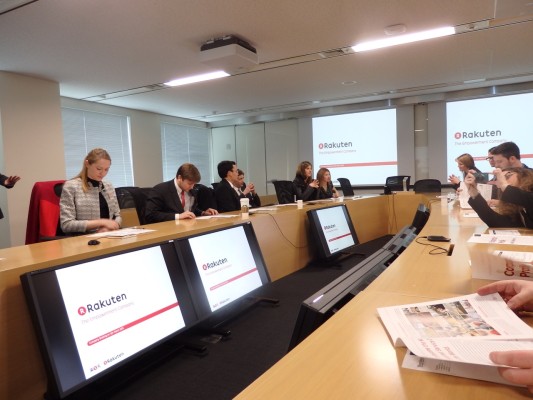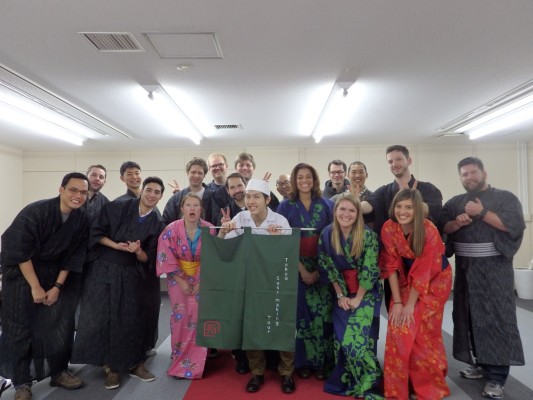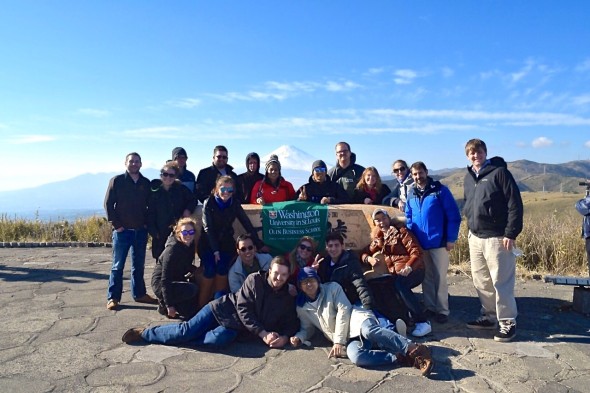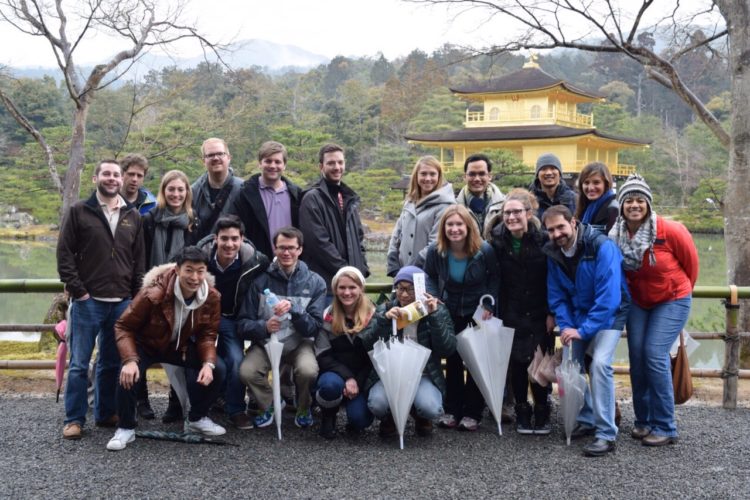This year’s Global Management Studies cohort recently re-lived their trip to Japan while enjoying sushi and watching a spectacular video presentation by faculty advisor, Sergio Chayet. This was Chayet’s second GMS tour of Japan, “The students did a lot of work researching the companies we visited and they did all the planning and execution of the trip.” Chayet is Senior Lecturer of Operations and Manufacturing Management; Academic Director of the MS in Supply Chain Management Program; and Director of the Operations and Supply Chain Management MBA Platform.
“I took care of the academic portion by giving a few lectures and assigning/discussing case studies with them,” Chayet says. “The student leads also gave presentations on Japan’s history, culture, business etiquette, food/drink etiquette, and background on some of the temples we visited and background on sumo.”
Below are some excerpts from assignments written by GMS Japan students.
Academic Lessons:
“Global supply chain creates new management challenges faced by many businesses worldwide. Globalization also brings new opportunities and threats to companies. Growing foreign demand generates more sales while at the same time requires more resources and labor that may need to be procured locally and adds new logistical challenges. Political stability and economic conditions also need to be taken into account when deciding to conduct business in a foreign country. The GMS course introduced us to managerial insights and touched on issues on global business management.” Peter Tobing
“7-eleven uses the locations of its stores both to enhance its supply chain and limit the presence of its competitors. Instead of spreading stores throughout the entirety of cities, 7-eleven clusters its stores in concentrated areas. Doing this serves a dual purpose. First, it allows deliveries to be made more efficiently from distribution centers. Second, clustering stores together deters competitors from opening stores in the same areas. 7-eleven is able to dominate markets through supply chain efficiency.” Douglas Golann
 “I enjoyed learning about Rakuten and the vast array of companies and industries it is involved in. Rakuten is rapidly expanding, and since studying it, I have seen Rakuten multiple times.
“I enjoyed learning about Rakuten and the vast array of companies and industries it is involved in. Rakuten is rapidly expanding, and since studying it, I have seen Rakuten multiple times.
My portion of our presentation was an overview of the company, so I researched all the industries Rakuten had expanded to include. It has recently acquired a few American companies, so it already has a presence in the US. It is involved with everything from retail to sports to financial services! Rakuten has a fully integrated system, so you can bank and buy through its financial ecosystem.” Allison Campbell
Trip Lessons:
“The visit to the Toyota plant was a perfect extension of our Operations class, allowing us to see the production process we read about in real life. I was impressed by how clean and well-organized the Toyota plant was, and especially by how calm an environment it was. The lesson I took away was how valuable it is to establish a proper balance between human and technological labor – not to entirely supplant one with the other, but to determine the optimal way for them to work together. The result for Toyota seems to be a well-respected process, well-regarded cars, and happy employees.” Maggie Hughes
 “The cultural experience is something that could not have been learned in a traditional course. Japanese business culture is very formal and polite. The extent to which respect and formality are important in the culture could not be experienced in a course. This may help me in my business career because I plan on working in M&A consulting. Many acquisitions are international, and understanding other cultures will help me interact with international professionals when I am working on these deals.” Louis Milone
“The cultural experience is something that could not have been learned in a traditional course. Japanese business culture is very formal and polite. The extent to which respect and formality are important in the culture could not be experienced in a course. This may help me in my business career because I plan on working in M&A consulting. Many acquisitions are international, and understanding other cultures will help me interact with international professionals when I am working on these deals.” Louis Milone
“Interacting with Japanese people provided insight not only into the importance of creativity, but also into how customs and social norms form the foundation of trust between people. As I work with several companies in St. Louis with Japanese parents, these insights taught me what is important and why it is important. The culture is somewhat insular but very advanced and filled with creativity (i.e.Toyota plant; new ideas around energy at Rakuten). “ — Julie Evans
 “Attention to detail is a trademark of Japanese companies and their employees in everything they do. This transcends relationships between companies and their customers as well as business to business relations. It applies to manufacturing processes where every detail is attended to and perfected; products are thought out carefully and done in best way and quality possible including the packaging and final presentation to the customers; when dealing with partners such things as little gifts for visitors always take place; attention to details and dedication also take place in everyone’s daily life.” Alexandra (Sasha) Sukhareva
“Attention to detail is a trademark of Japanese companies and their employees in everything they do. This transcends relationships between companies and their customers as well as business to business relations. It applies to manufacturing processes where every detail is attended to and perfected; products are thought out carefully and done in best way and quality possible including the packaging and final presentation to the customers; when dealing with partners such things as little gifts for visitors always take place; attention to details and dedication also take place in everyone’s daily life.” Alexandra (Sasha) Sukhareva
About the CEL & GMS
Global Management Studies (GMS) provide international perspective and exposure to global businesses and emerging markets. Student-led teams conduct field research in a chosen geographic region and business sector, engaging with business leaders and building a network through social and inter-cultural engagements.
The Center for Experiential Learning (CEL) is an educational center located in the Olin Business School at Washington University in St. Louis. The CEL is focused on creating innovative learning opportunities that result in meaningful impact in the business and nonprofit communities. Learn more about the CEL and its programs at olin.wustl.edu/CEL.



